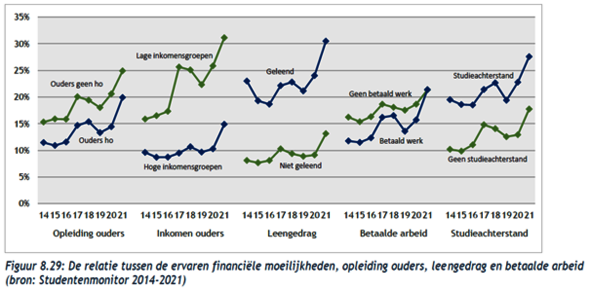It appears once again that some students are more successful than others in higher education, according to the annual Policy Measures Monitor, which Education Minister Robbert Dijkgraaf sent to the House of Representatives on Tuesday.
In the report, research agency ResearchNed outlines the many trends in higher education, to the extent that they are apparent from the figures. For example, what academic success do particular groups of students have?
Parents’ income
The parents’ income plays a major role. Students still have less chance of graduating if their parents earn little money. That is certainly the case in higher professional education.
The authors of the monitor make a distinction between five different income groups. At universities of applied sciences, the distribution is considerable: there is a gap of more than 15 percentage points between the academic success of students from families with the lowest and highest incomes.
At research universities students from the poorest families tend to lag behind, but other differences are smaller than in higher professional education.
Students’ Income
Additionally, students are experiencing financial problems more frequently. In the last academic year, the percentage rose from 17 to 22 percent. This particularly affects groups that were already in difficulty.
One in three students from low-income families now has financial problems. The same applies to students from families without a highly-educated parent. Those groups will of course overlap.
The financial problems can have an effect on a student’s academic career. Students from poorer families tend to lag behind, even though the monitor says they spend more time on their studies. They drop out earlier and are also more likely to switch study program.
Men and women
The difference between men and women also catches the eye, as always. In higher professional education around 40 percent of the men get their bachelor’s degree within five years (i.e. with a delay of no more than one year) as opposed to 60 percent of the women.
In the three-year bachelor’s programs more than 80 percent of the women graduate within four years. The figure for their male counterparts remains just below 70 percent.
Dijkgraaf
Minister Dijkgraaf remains silent on the results of the monitor because a major review of the system is on its way, to which he will respond after the summer. He will then readdress the issues raised by this monitor.
The basic student grant makes its return in September. And in the next academic year students living away from their parents' house will get 164 euros extra in basic student grant because of the high inflation. There will also be a one-off energy allowance of 400 euros for students who have a supplementary grant and live away from their parents' house. It does not matter if they live in a space with own facilities or shared housing.




Discussion